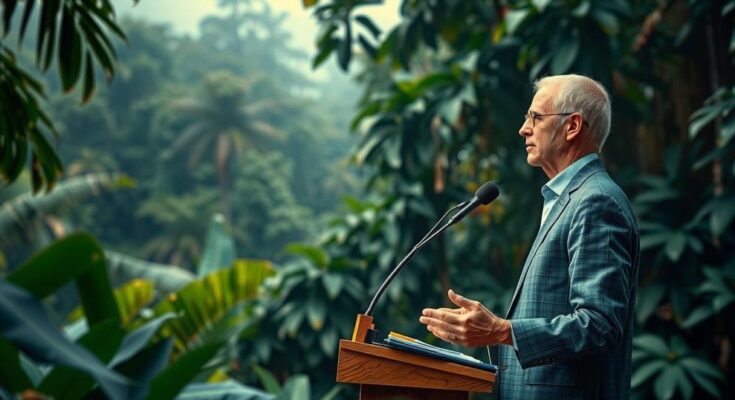President Joe Biden made a historic visit to the Amazon rainforest, declaring the U.S. clean energy revolution irreversible amid climate change challenges. Observing direct impacts of climate change, he reiterated commitment to environmental preservation while indicating significant funding contributions. His visit highlighted the urgency of global cooperation to protect the Amazon, essential for maintaining biodiversity and addressing climate change threats.
On November 18, President Joe Biden embarked on a historic visit to the Amazon rainforest, the first by a sitting American president, where he witnessed the severe impacts of climate change. Despite the anticipated transition to a Trump administration, which may reverse key environmental policies, Biden asserted that the clean energy revolution in the U.S. is irreversible. “Nobody, nobody can reverse it,” he emphasized, highlighting the broad bipartisan appreciation for clean energy initiatives. The Amazon, crucial for global carbon storage, is experiencing alarming deforestation and ecological decline, fueled by developmental pressures and climate change. Biden expressed his administration’s commitment to combat climate change, pledging significant investments in international climate financing, including a noteworthy USD 500 million contribution to the Amazon Fund, demonstrating a strategic focus on supporting environmental preservation amid rising skepticism from opposing political factions. During his tour, Biden observed extensive environmental degradation and engaged with indigenous communities, reinforcing the symbolic significance of the Amazon as the “lungs of the world.” He declared November 17 as International Conservation Day, underscoring the necessity of global cooperation in preserving biodiversity and combating climate change. As the Amazon faces unprecedented droughts that threaten local communities and wildlife, Biden’s administration prepares to bolster assistance despite the uncertainty surrounding future U.S. climate policies under his successor. Biden concluded his visit underscoring the critical nature of the environment by stating that, “The fight to protect our planet is literally a fight for humanity.” This emphasis marks a stark contrast to the anticipated rollback of environmental initiatives by the Trump administration, which has downplayed climate change risks. With Brazil’s commitment to “zero deforestation” by 2030, the trajectory of Amazon environmental policies remains pivotal in the global climate dialogue. Although future U.S. commitment amid the new administration remains uncertain, experts caution against expecting immediate tangible outcomes from Biden’s visit. Instead, they stress the importance of sustained international collaboration to address the urgent climate challenges facing the Amazon and the planet overall.
The Amazon rainforest is a critical ecosystem, known as the “lungs of the world” due to its significant role in carbon dioxide absorption and oxygen production. This vital region houses 10 percent of Earth’s biodiversity but is increasingly threatened by deforestation and climate change. President Biden’s focus on climate change has been a hallmark of his administration, highlighted by significant federal investments aimed at promoting clean energy and environmental sustainability, reflecting a broader concern for global climate preservation. As the world grapples with climate shifts, the future of the Amazon and its role in mitigating climate change is more critical than ever.
President Biden’s visit to the Amazon serves as a pivotal moment in reiterating U.S. commitment to climate action, contrasting sharply with the impending policy direction of the incoming Trump administration. His declarations emphasize the importance of a unified global front in addressing climate change, especially in jurisdictions as significant as the Amazon. Notably, the ongoing efforts to financially support the Amazon Fund underscore the urgent need for international cooperation to safeguard the world’s most important biodiversity reserves, despite skepticism about the continuation of such efforts amidst political transitions.
Original Source: www.theweek.in




